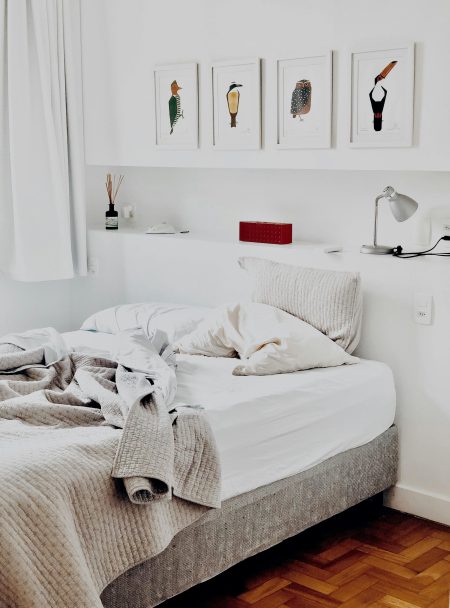- In line with men’s health week, searches for ‘office declutter’ is up by +200%.
- Tapi Carpets & Floors have conducted a survey to reveal the desk habits of men.
- Dr Eleanor Bryant has shared why decluttering your desk can make a big difference to your mood.
As Men’s Health Week (June 9th–15th) approaches, experts are advising men to rethink their workspaces, not just for productivity, but for peace of mind. With mental health becoming an increasing priority, online searches1 for ‘office declutter’ have surged by over +200%, suggesting a national appetite for workspace makeovers.
A recent survey2 from Tapi Carpets & Floors reveals that 84% of men feel relaxed and focused when their surroundings are tidy, yet over a quarter cite lack of time as their biggest barrier to maintaining a clean workspace.
The results have prompted psychologist Dr Eleanor Bryant3 to team up with interior trends expert at Tapi Carpets & Floors Johanna Constantinou to explore quick desk-refresh tips to improve daily mental health.
“A tidy home office isn’t just about aesthetics,” says Johanna. “It’s about creating a space that works for you, not against you. When your surroundings are calm and controlled, your mind often follows suit.”
“For those working from home, where the lines between personal and professional life can become blurred, this load can feel even heavier. A well-organised space, on the other hand, provides a visual cue for calm and control, helping the brain to feel more settled and productive,” explains Dr Eleanor.
1. Clutter is biologically stressful
According to the survey, 36% of men say the state of their workspace makes a big difference to their productivity and focus, with an additional 43% stating it helps somewhat. This supports findings that visual mess can directly increase cortisol levels, contribute to burnout, and affect mood regulation.
“There’s a strong psychological link between clutter and stress4,” says Dr Bryant. “It creates mental ‘noise’ that competes for your attention, reducing your cognitive capacity.”
Johanna adds: “Clutter is exhausting. Our survey found 35% of men struggle with a lack of storage solutions, and 22% feel overwhelmed trying to manage the mess. That’s why design strategies like hidden storage, soft lighting, and zoning are essential, they visually calm the environment and create cognitive clarity.”
2. Start off small
You don’t need a full office overhaul to experience psychological benefits. Simple, achievable changes to your physical space can shift your mindset, improve focus, and reduce fatigue. The survey reveals that 16% of men admit they don’t know where to start, so removing the pressure to ‘do it all’ can kickstart progress.
“Pick one small zone, just your desktop, a drawer, or cable area, and set a timer for 10 minutes,” suggests Dr Bryant. “The hardest part is starting. Once momentum builds, you’ll often feel a sense of relief and success that drives further action.”
“Even micro-changes like introducing a plant, managing cables, or elevating your monitor can lower stress and sharpen focus,” says Dr Bryant. “These visual and physical cues reinforce calm and control.”
3. Keep the essentials near
A workspace crowded with too many items overwhelms the brain. According to the survey, 43% of men take breaks only every couple of hours, and 15% just once or twice a day, so, the space you spend hours in really matters.
“A cluttered desk constantly signals unfinished tasks, which can elevate stress levels without you even realising,” says Dr Bryant. “Your brain thrives in environments with fewer distractions. Designate zones for essentials, laptop, notebook, one pen, and tuck away the rest.”
Johanna adds: “Minimising what’s visible helps create breathing space. Use drawer dividers, cable tidies, or desktop risers to keep your workspace clean but functional. And don’t forget your floor, clutter at ground level contributes just as much to mental noise. A soft, clean carpet underfoot can subtly reinforce a calm, grounded feeling.”
4. Use storage to reduce visual ‘noise’
Even neatly arranged items can drain your mental bandwidth if they’re constantly in sight. With more than a quarter of men citing ‘lack of time’ as a barrier to maintaining tidiness, investing in smart storage is a game-changer.
Use closed storage, like boxes, drawers, or baskets, to tuck items out of sight. “Reducing visual clutter helps lower cognitive strain,” says Dr Bryant. “It’s not about minimalism, it’s about clarity. When your brain isn’t constantly scanning random objects, it frees up bandwidth for focus and creativity.”
Johanna recommends to, “Opt for stylish storage that fits your aesthetic. Matching containers or shelving create a cleaner, more cohesive look and when your space feels ‘designed’, you’re more likely to keep it that way.”
5. Personalise with purpose
Decor can quickly become just another distraction if it lacks intention. The survey data shows 28% of men describe their workspaces as ‘very tidy and organised’, while 38% say they’re only ‘somewhat tidy.’ Thoughtful design choices can help close that gap.
Limit yourself to one or two meaningful objects, like a framed photo, a motivational quote, or a calming piece of artwork. “These items create emotional comfort without contributing to mess,” says Dr Bryant. “It gives your workspace identity while keeping visual simplicity.”
Johanna notes: “Your space should inspire you. A few carefully chosen touches make your desk feel personal, while still supporting mental clarity. Think of it as curating your focus zone.”
“Bringing colour and texture into the workspace can also have a powerful impact on mood and productivity. Soothing tones like soft blues, muted greens, and warm neutrals help create a sense of calm, reducing stress and supporting mental clarity throughout the day. Complementing these colours with natural textures, such as wood, linen, and stone, adds depth, making the environment feel more inviting.” she adds.
6. Make decluttering a habit
Clutter creeps in gradually, so without a routine, your desk will likely revert to chaos. Over one in six men say they simply have ‘too much equipment’ and without routines, it builds up fast.
Make a 5-minute end-of-day tidy part of your shutdown ritual. “This small habit becomes a mental reset,” says Dr Bryant. “It tells your brain: work is done, you can relax now. That’s especially important for many working from home, where boundaries are already blurred.”
Johanna suggests pairing this with ambient cues: “Opt to turn off a desk lamp at the end of the day to signal downtime. Design rituals like this reinforce structure and help maintain a workspace that supports your headspace.”
“Your workspace isn’t just functional, it’s emotional,” Dr Eleanor Bryant finishes with. “This men’s health week, take time to reset. It isn’t indulgent, it’s a strategic way to support your brain and your mood.”
“Small changes can have a big impact,” concludes Johanna. “From the floor beneath you to the items in front of you, every element of your space can work with you, or against you.
To find out more information, please visit https://www.tapi.co.uk/the-ideas-hub/by-room/best-flooring-for-home-offices









